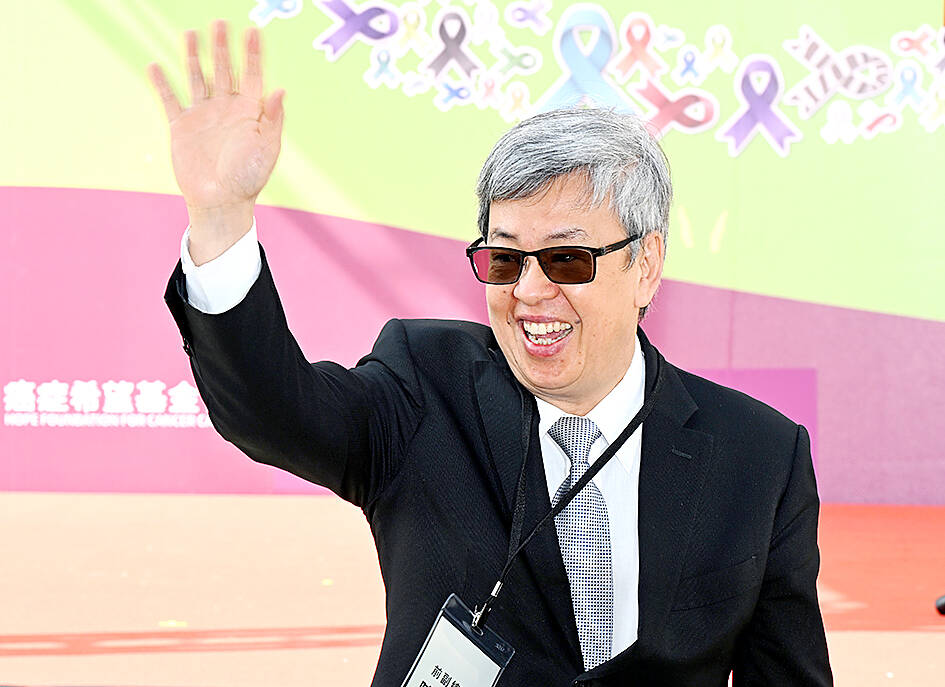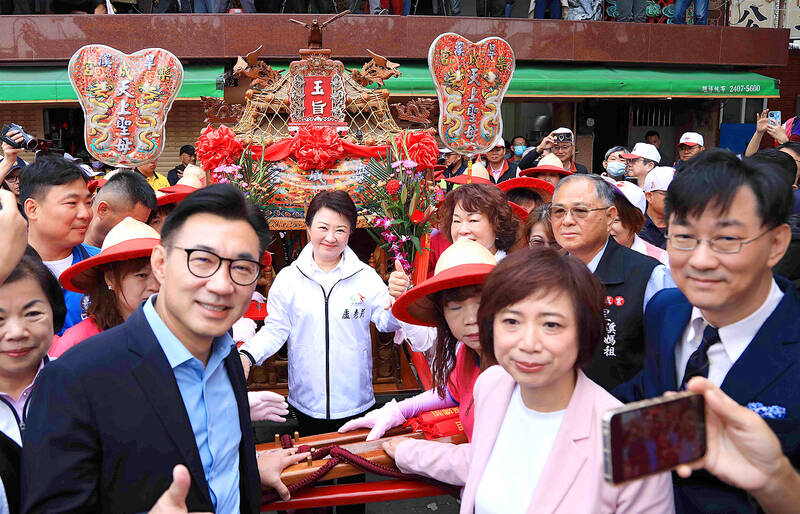The 1990s were a turbulent time for the Chinese Nationalist Party’s (KMT) patronage factions. For a look at how they formed, check out the March 2 “Deep Dives.”
In the boom years of the 1980s and 1990s the factions amassed fortunes from corruption, access to the levers of local government and prime access to property. They also moved into industries like construction and the gravel business, devastating river ecosystems while the governments they controlled looked the other way.
By this period, the factions had largely carved out geographical feifdoms in the local jurisdictions the national KMT restrained them to. For example, one faction might control the coast, while another was inland, such as the Black and Red factions in then-Taichung county.

Photo: Liao Chen-huei, Taipei Times
In some areas power-sharing arrangements existed with factions alternating power, with one faction holding the county commissioner and the other holding the county council speaker position, then reversing their roles.
With all this money and power at stake, the factions had come to resemble organized crime, with which they might have cooperated or competed with.
The late 1980s and especially the 1990s are remembered for lawlessness. The lifting of martial law left the police in charge of public security to a degree they had not been before, but too many were both corrupt and incompetent.

Photo: Liao Chen-huei, Taipei Times
Both gangsters and factional politicians acted with impunity in their scramble for riches and power. Violence was common and political assassinations soared.
The most dramatic case was in 1996 when two suspected killers subdued guards and rounded up Taoyuan county commissioner Liu Pang-yu (劉邦友) and seven others at his residence, blindfolded them and shot them in the head execution style.
The case was never solved, nor are the reasons for the executions known, but it was widely viewed as emblematic of the world of “black-gold” politics prevailing at the time. In response, Taoyuan voters elected Annette Lu (呂秀蓮) of the Democratic Progressive Party (DPP) as Taoyuan county commissioner to try and cope with the problem, and the widespread perception of her competence was partly why she was put on the ticket in the 2000 election as the vice presidential candidate.

Photo: Tsai Shu-yuan, Liberty Times
SHIFTING POWER DYNAMICS
The introduction of democracy in the 1990s in national politics caused a shift in KMT power dynamics between the local factional politicians and the party elites who were mostly from the families that had escaped the Chinese Civil War.
The original reasons for the factions’ existence were largely gone. There was no longer a language barrier and using the local elites via the factions to control the local population during the White Terror was no longer necessary.
A dilemma formed for the KMT politically.
On the one hand, the blatant corruption, criminal behavior and violence perpetrated by the factions seriously damaged the reputation of the party and the party elites and their electoral fortunes.
On the other hand, the get-out-the-vote abilities of the factions at the local level were powerful electorally.
Distinctions were also blurred by an increasing number of party elites from Chinese Civil War exile families marrying people in powerful factional families.
Former presidential candidates such as current KMT Chairman Eric Chu (朱立倫) and Legislative Speaker Han Kuo-yu (韓國瑜) are among those elites marrying factional figures, as is current Taichung Mayor Lu Shiow-yen (盧秀燕), widely tipped to be the KMT’s 2028 presidential candidate.
In 1993 during the Lee Tung-hui (李登輝) administration, future president Ma Ying-jeou (馬英九) was appointed justice minister. Ma’s disdain for the local factions is now legendary.
By 1996, over one-third of all city and county councilors were being prosecuted, causing panic among the factions.
Though Ma’s actions were widely popular, the pressure inside the party grew too great and by September 1996 he was sacked.
Though never as sweeping as Ma’s attacks on the factions, the party elites in government would launch on-again, off-again crackdowns, then ease off when elections rolled around. Crackdowns continued in the 2000s under the DPP.
Some of the key sources of power for the factions were also stripped from them, such as local credit cooperatives.
INTERNAL ISSUES
Cracks were appearing within the factions in the 1990s. In some cases the second, third or fourth generations of key factional clans were uninterested, wanted to go clean, joined the boom in investing in China or were just incompetent.
A surprising fact is that former vice president and premier, and current DPP member Chen Chien-jen (陳建仁), whom the Catholic Church has invested as Knight of the Equestrian of the Holy Sepulchre of Jerusalem and a Knight of the Pontifical Equestrian Order of St. Gregory the Great, is the son of the founder of Kaohsiung’s White Faction. The same faction headed by former legislative speaker Wang Jin-pyng (王金平). Chen has distanced himself from his origins very successfully and currently has an almost saintly reputation.
The crackdowns led to many being jailed, depriving the factions of talent, in some cases permanently. Others fled to China to avoid arrest.
Still others lost to the newly organized DPP, though to this day the KMT dominates in city and county councils.
In major urban areas the factions largely disappeared, including the one Lu Shiow-yen married into. In city centers it was hard to maintain the retail politics that the factions were so good at.
In more rural areas it is easier to mobilize voters, and get them to put their mark on ballots in a position that indicates which group the voters were from. This ensured compliance, but there are too many voters in urban areas for this to be feasible or make much of an impact.
The merger of Taipei County into New Taipei City and the mergers of Taichung, Taoyuan, Tainan and Kaohsiung counties and cities into metropolises also deprived the factions of many political opportunities. In counties like Changhua there are individual elections for Changhua City, Yuanlin City and all the various townships, offering many opportunities for up-and-coming factional politicians.
All of those individual elections are now rolled into only one for those new metropolises. While the factions still operate and have some power in what used to be Taichung and Kaohsiung counties for example, it is more diluted, though Taichung Mayor Lu did appoint key positions in her government to figures from the Red and Black factions, and several of the city’s legislators are from those factions.
REVOLUTION COMING
All this turmoil led to some factions splintering, others consolidating or overwhelming their rivals. However, in places like Taichung and Kaohsiung the original factions remain intact.
Some new factions formed around figures who built a strong enough power base of their own to outshine the traditional factions.
Among them are the current KMT caucus convener Fu Kun-chi (傅崐萁) — dubbed the “King of Hualien” — and the one I assess to be the most powerful of all, Chang Jong-Wei (張榮味).
In recent years, spurred on by Wang Jin-pyng, have launched a revolution in how their factions operate and dynamics within the KMT.
Stay tuned.
Donovan’s Deep Dives is a regular column by Courtney Donovan Smith (石東文) who writes in-depth analysis on everything about Taiwan’s political scene and geopolitics. Donovan is also the central Taiwan correspondent at ICRT FM100 Radio News, co-publisher of Compass Magazine, co-founder Taiwan Report (report.tw) and former chair of the Taichung American Chamber of Commerce. Follow him on X: @donovan_smith.

Last week the story of the giant illegal crater dug in Kaohsiung’s Meinong District (美濃) emerged into the public consciousness. The site was used for sand and gravel extraction, and then filled with construction waste. Locals referred to it sardonically as the “Meinong Grand Canyon,” according to media reports, because it was 2 hectares in length and 10 meters deep. The land involved included both state-owned and local farm land. Local media said that the site had generated NT$300 million in profits, against fines of a few million and the loss of some excavators. OFFICIAL CORRUPTION? The site had been seized

Next week, candidates will officially register to run for chair of the Chinese Nationalist Party (KMT). By the end of Friday, we will know who has registered for the Oct. 18 election. The number of declared candidates has been fluctuating daily. Some candidates registering may be disqualified, so the final list may be in flux for weeks. The list of likely candidates ranges from deep blue to deeper blue to deepest blue, bordering on red (pro-Chinese Communist Party, CCP). Unless current Chairman Eric Chu (朱立倫) can be convinced to run for re-election, the party looks likely to shift towards more hardline

The depressing numbers continue to pile up, like casualty lists after a lost battle. This week, after the government announced the 19th straight month of population decline, the Ministry of the Interior said that Taiwan is expected to lose 6.67 million workers in two waves of retirement over the next 15 years. According to the Ministry of Labor (MOL), Taiwan has a workforce of 11.6 million (as of July). The over-15 population was 20.244 million last year. EARLY RETIREMENT Early retirement is going to make these waves a tsunami. According to the Directorate General of Budget Accounting and Statistics (DGBAS), the

Sept. 15 to Sept. 21 A Bhutanese princess caught at Taoyuan Airport with 22 rhino horns — worth about NT$31 million today — might have been just another curious front-page story. But the Sept. 17, 1993 incident came at a sensitive moment. Taiwan, dubbed “Die-wan” by the British conservationist group Environmental Investigation Agency (EIA), was under international fire for being a major hub for rhino horn. Just 10 days earlier, US secretary of the interior Bruce Babbitt had recommended sanctions against Taiwan for its “failure to end its participation in rhinoceros horn trade.” Even though Taiwan had restricted imports since 1985 and enacted